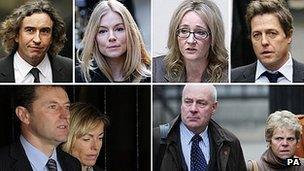Leveson Inquiry: 'Newsroom pressure' on ethics
- Published

Many well-known faces have been among those to give evidence to the media ethics inquiry
The culture of newsrooms puts great pressure on journalists' ethics, the Leveson Inquiry has heard.
Journalism students were usually taught ethics but feared losing their jobs if they did not do what was expected of them, media academics said.
Many people entering the profession were initially quite "idealistic", Professor Steven Barnett of the University of Westminster said.
The inquiry is looking at the "culture, practices and ethics of the media".
Professor Barnett said: "There's an abundance of people who are keen, eager, quite idealistic about their view of what journalism can do, what they can achieve as journalists, the role of journalism in a democratic society."
But when they entered the workplace they were told that if they did not do what was asked of them they could be replaced by other "young, willing recruits", he said.
"I'm talking specifically now about the kinds of national tabloid newspapers where a lot of these problems have occurred," he said.
Angela Phillips, who runs the print journalism programmes at Goldsmiths, University of London, said the courses taught students to be ethical, knowing that when they started work they would be "under constant pressure".
Some journalists "get trapped" working for tabloids as they pay more than other newspapers, and "go with it" for financial reasons, she said.
The academics said only a "small corner" of the journalists' training diploma, run by the National Council for the Training of Journalists, addressed "ethical questions".
Art and skill
The positive side of tabloid journalism was also emphasised at the hearing on Thursday.
Professor Barnett, a former Observer columnist, said there was an "art and a skill" to good tabloid journalism.
"The issue is getting the best of that while avoiding those egregious excesses that we've seen over the last couple of years," he said.
Ms Phillips said tabloids were "really funny a lot of the time".
"I don't think we want everyone to be the same as the Guardian, the Telegraph, the Times and the Independent," she added.
Lord Justice Leveson said he did not want to "beat down" the mid-market or the tabloid press, saying: "They do, in large part, an enormously valuable job."
The problem was trying to "draw the line", he said.
The academics also attacked politicians for not doing enough to rein in the press.
Julian Petley, professor of screen media and journalism at Brunel University, said politicians were too "terrified" of the press to tackle the question of regulation.
They also discussed ways of solving the problems that led to the inquiry. These included giving an automatic right of reply to people written about in papers, and creating a parliamentary definition of public interest.
Lord Leveson's inquiry is looking at the "culture, practices and ethics of the media" and whether the self-regulation of the press works.
Prime Minister David Cameron set up the inquiry after the News of the World admitted intercepting voicemail messages of prominent people to find stories.
The inquiry has already seen a procession of celebrities who said they had been victims of press practices and a number of journalists who offered a view on the workings of tabloid newsrooms.